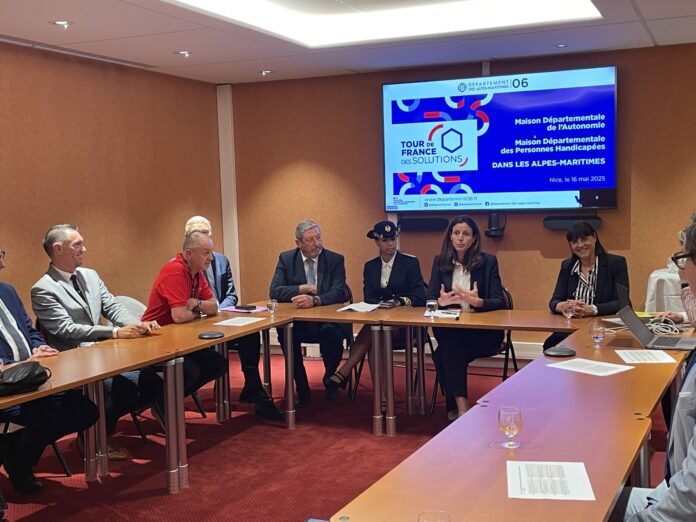The Departmental House of Autonomy (MDA) of the Alpes-Maritimes welcomed on Friday, May 16, 2025, Charlotte Parmentier-Lecocq, Minister of Autonomy and Disability during a meeting bringing together users, association representatives, and field agents as part of the national major project to transform the MDPH (Departmental Houses for Disabled People).
A year after the creation of the Departmental House of Autonomy (MDA) in the Alpes-Maritimes and the opening of its 12 branches, attendance has surged by 320%. This is a sign of a real need for proximity and strengthened support. However, behind these encouraging figures, many restrictions remain for people with disabilities, as revealed by the three working groups formed for the occasion: users, associations, and MDA professionals.
Nicolas Gory, rapporteur of the users’ group, initiated the exchanges. He highlighted the main obstacles. Notably, overly general information, difficulty in obtaining appointments, and especially an administrative culture too complex for many applicants. “When you have neither the medical codes nor those of the administration, compiling a file becomes a challenge,” he explains.
Another issue raised was access to information on the progress of a file, often non-existent. “Knowing where the file processing stands could ease a lot of anxieties,” stated a participant.
More suitable and more human forms
The second work theme was the heavy paperwork. Particularly those intended for children or young adults. A demand emerged to differentiate between adult/children files and accompany them with clear explanatory notes, similar to tax tips or certain public websites. “When the child is just 18, the support is not going to be the same,” notes a mother.
“The project of life is one of the most difficult points, especially when a disability has just been diagnosed,” recalls a user. “How to project oneself when still in shock?” Proposals emerged, including creating orientation grids inspired by the experiences of other disabled individuals and promoting associations as support in compiling files.
More readable notifications, better-understood rights
Carine Taddia, association representative, emphasized the lack of knowledge about rights, both on the beneficiary and professional sides. Too often, an unreadable notification full of acronyms prevents people from fully exercising their rights. “There needs to be humanity behind the procedures,” she insists. “Real support, not just an automatic letter.” A sentiment shared by the agents themselves. They advocate for clearer and better-suited tools to meet field needs. For example, they mention the necessity of a specific form for the Disability Compensation Benefit (PCH) or establishing a systematic interview at age 16 to support the transition to adulthood.
A local dynamic serving a national ambition
Also present at the table were the sub-prefect, the departmental councilor, the departmental director, and the general director of services. All have praised the participatory approach initiated in the Alpes-Maritimes, where public policies are built with those first concerned. Charlotte Parmentier-Lecocq, Minister of Autonomy and Disability, concluded the proceedings with emotion: “I want to thank each of you for this foundational work. Your ideas, your proposals, will help me build concrete solutions for all territories. What you have started here is already the transformation.”
The minister highlighted the collective determination of users, associations, and agents to shift the lines. This work, she promised, will inform the future steps of the national plan, particularly on the diagnostic pathway and the methods of reporting developments directly to field actors.


